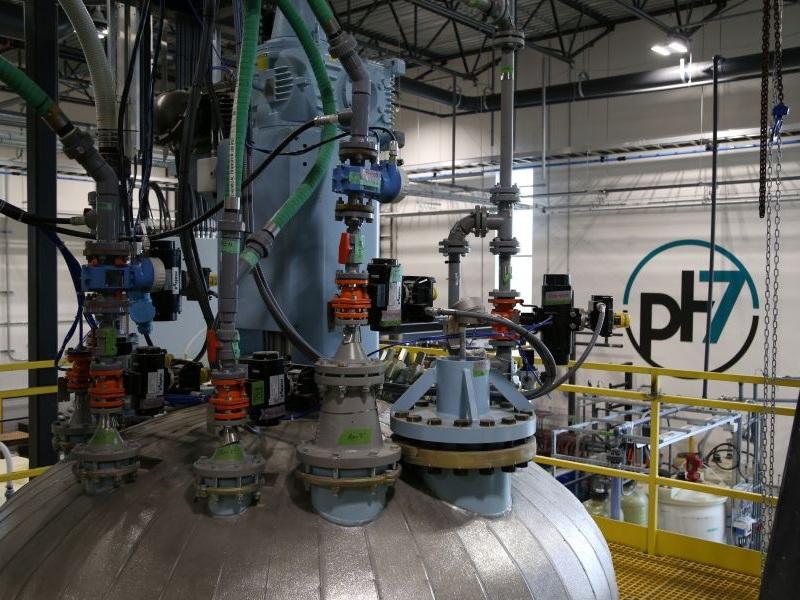Recent Articles
CaGBC event examines Canadian green building issues
CaGBC event examines Canadian green building issues
Recent Canadian experiences in advanced green building projects were discussed at a May 17 Canada Green Building Council breakfast event at Toronto’s Fairmont Royal York Hotel. Luka Matutinovic, WSP’s director of national performance, analysis, sustainability and energy, talked about strategies for delivering proven performance through energy modeling, measurement and verification (M&V) and commissioning.
Spire Developments building a niche in Vancouver
The people behind Spire Development have large ambitions. The Delta B.C.-headquartered developer has been carving out a niche in the Lower Mainland with projects such as an exclusive condo building in the south Granville neighbourhood, car washes with $10-million construction price tags and Vancouver’s largest, multi-unit, Passive House apartment building.
Toronto’s first vertical forest concept a tree covered tower
Near the exclusive shopping district of Yorkville, only blocks from the hustle of midtown Toronto, is where an architect envisions the first “vertical forest in Canada,” a terraced glass tower covered in 400 four- to five-metre trees. But the intent isn’t to design a building that just looks striking. It will create “a sustainable microclimate on its own,” said Brian Brisbin, principal of Toronto’s Brisbin Brook Beynon Architects.
From historic to cutting edge: Revitalizing iconic buildings
The world’s iconic buildings achieve celebrated status because their architecture stands the test of time. But what lies beneath those enduring facades? Design and engineering evolve quickly, and many urban buildings—nearly half the office space in New York City was built before 1945—predate concepts like sustainability, climate change, and even recycling, resulting in waste and inefficiency.
LEED must be updated to address climate change
This is part one of this story. Part two is below. Over the last 20 years, LEED has become the dominant U.S. green building design standard and is the most influential standard of its kind globally. This is an extraordinary achievement and has made for healthier, more productive and greener homes, workplaces, schools, hospitals and public spaces for tens of millions of families, students and workers.
Here’s how to move LEED forward on climate change
This is part two of this story. Part one is above. The proposal I support along with more than 150 longtime green builders, “LEEDing on Climate Change,” seeks to establish minimum levels of carbon reduction by level for LEED, supports USGBC in its current LEED upgrade and reflects the scientific urgency of climate change.
South Africa aims for ‘zero carbon’ buildings in green push
Bulelwa Makalima-Ngewana knows how much cash going green can save. Four years ago, after signing up for “My Green Home”—an effort by the Green Building Council of South Africa to make buildings more energy efficient—her family saw their house in the middle-class suburb of Pinelands receive an energy efficiency retrofitted.
 |
WorldGBC, CaGBC partner in 2018 conferences |
| The World Green Building Council Congress 2018 will be held in Toronto, Canada, in June, in partnership with the Canada Green Building Council’s Building Lasting Change conference. | |
| World GBC, April 24, 2018 |
Net-zero energy buildings market to reach $79B by 2025
According to a report by Grand View Research, Inc., the global net-zero energy buildings (NZEBs) market is estimated to attain size worth USD 78.79 billion by the end of 2025. Growing requirement for onsite renewable energy sources in residential and commercial buildings to reduce carbon emissions can stoke the growth of the market during the forecast period (2017 to 2025).
Building systems aim for smarter, greener management
The sophisticated growing systems for greenhouse operations closely manage every aspect of the interior environment. The systems make for some of the smartest buildings in the Lower Mainland, but office space is coming on strong as institutional owners embrace systems that smarten up their buildings.
Paris is building the eco-community of the future right now
Every so often an environmentally friendly building gives us a glimpse of the low-carbon future so many climate plans envision. With the development of Clichy-Batignolles, the city of Paris has created a groundbreaking eco-village filled with such buildings. Begun in 2002, the massive redevelopment project is about 30 percent complete and is slated to be finished in 2020.
Waste heat: An overlooked renewable resource
When you think of Facebook and “hot air,” a stream of pointless online chatter might be what comes to mind. But the company will soon be putting its literal hot air — the waste heat pumped out by one of its data centers — to good environmental use. That center, in Odense, Denmark, plans to channel its waste heat to warm nearly 7,000 homes when it opens in 2020.
 |
Try out your climate policy ideas |
| The Energy Policy Simulator (EPS) is Canada’s first free, open-source tool giving you a chance to see how energy and climate policies influence emissions across the country. | |
| Pembina Institute, March 2018 |
A key to unlock climate finance
Developing countries are in need of significant financial investments to reduce greenhouse gas emissions and build climate resilience. In most developing countries, government investments for climate change are limited. Governments need to rely on other external sources of funding. Identifying and accessing these funds, however, still remains a big challenge.
New coalition aims to undermine shareholder rights
A new coalition backed by the National Association of Manufacturers aims to ‘undermine critical shareholder rights that investors have long supported and relied on to help them effectively and efficiently protect the long-term value of their investments,’ Ceres CEO and President Mindy Lubber said in a statement.
Hidden stories of climate proposals in the 2018 proxy season
The 2017 proxy season offered some indelible headlines on climate-related shareholder action: majority votes at ExxonMobil, Occidental Petroleum and PPL Corporation; the first-ever votes in favor of climate shareholder proposals by major investors BlackRock and Vanguard; and the much-anticipated release of initial 2-degree scenario analyses from North American oil and gas and electric power companies.
Corporate sustainability evolves into the net positive movement
Businesses that have joined the corporate net positive movement seek to put more back into society and the environment than they take out. “Net positive is what I see as the next step in the evolution of corporate responsibility,” says Josh Prigge, founder and CEO of the sustainability consulting firm Sustridge, and host of the Sustainable Nation Podcast.
Products, Technology and Design
Utilities face the digital dilemma
When it comes to software, electric utilities are sometimes very far behind other companies. One of the key barriers identified during Clean Energy Finance Forum’s Electricity Evolution series has been challenges about the need to prove unfamiliar technology to this market.
The John Hope Gateway, a pioneer in modern wood construction
Arriving early at the West Gate of the Royal Botanic Garden in Edinburgh, I stared through the gate and wondered, who designed this marvelous mix of wood and glass? I found that the John Hope Gateway was designed by Cullinan Studio in 2009; today we take this kind of wood construction for granted, but back then it was really cutting edge.
Green Building Rating Systems
Forest certification a weapon in the fight to save forests
In those cases, the search for a silver bullet can delay meaningful action. Take deforestation, for example. Every year, the world loses nearly 75 million acres of forest — an area the size of Minnesota with South Carolina added for good measure. Sadly, there is no silver bullet to stop deforestation.
Certification schemes offer false promise of sustainability
Many certification schemes which supposedly help consumers make environmentally friendly decisions are standing in the way of greater sustainability and should undergo serious reform, according to a new report. The findings come in new research from the Changing Markets Foundation.
Market Trends and Research
Innovative farmers wanted to slow algal bloom on Lake Erie
As summer approaches, researchers have their eye on Lake Erie, where summer blooms of toxic algae, known as cyanobacteria, have been taking a toll on the local economy and raising public health concerns for at least 15 years.
Top five green building trends for 2018
While affordability and efficiency are still among the most important principles of real estate construction, the focus is slowly being shifted towards certain new green trends. It can be said that sustainability and the green factor have become or are very close to becoming the standard of building, and now, those principles are developing even further, branching out into new directions.
Market trends and research
Construction industry chemicals market to hit $80bn by 2023
The demand for specialist construction industry chemical products is set to rise steadily over the next five years due to rapid urbanisation across Asia Pacific and the BRICS economies, as well as a growing awareness of green building techniques. According to a report by P&S Market Research, the global construction chemicals market was worth $55bn in 2017 and will grow at a rate of 6.5% a year to reach around $80bn by 2023.
Commercial real estate
Contaminated-site developments hit 20,000-page speed bump
After the most recent update, B.C.’s Contaminated Sites Regulation (CSR) now covers 20,000 pages, and the costs to meet the requirements continue to increase, according to companies hired to decipher how the rules apply to real estate developers and owners. On November 1, 2017, Stage 10 omnibus amendments to the CSR came into effect.
Renewable Energy
Canada set to join International Renewable Energy Agency
Speaking at the ninth Clean Energy Ministerial in Copenhagen, Kim Rudd, Parliamentary Secretary to the Minister of Natural Resources, announced that Canada is set to join the International Renewable Energy Agency (IRENA) — the world’s largest intergovernmental organization driving the deployment of sustainable renewable energy.
What’s in store for the future of energy markets, day to day?
How do solar and wind influence energy prices? And as power plants last for decades, what should policymakers and investors think about to ensure that investments in power infrastructure pay off in the future?
Government Programs and Incentives
Canadian green infrastructure initiatives announced
More than $3 million in funding has been approved for 50 new initiatives in communities across Canada through two programs — the Municipal Asset Management Program and the Green Municipal Fund. Amarjeet Sohi, minister of infrastructure and communities, and Jenny Gerbasi, president of the Federation of Canadian Municipalities, made the announcement May 14.
Corporate Sustainability
Why your climate strategy is central to wooing millennials
As an avocado-loving, debt-ridden, fully paid-up member of the millennial generation, it probably won’t come as a surprise that I care about issues such as climate change, social justice and Trump in the White House. So do my friends.
Transit, bikes and transportation
Policy, falling battery costs drive record year for electric cars
The number of electric and plug-in hybrid cars on the world’s roads exceeded 3 million in 2017, a 54% increase compared with 2016, according to the latest edition of the International Energy Agency’s Global Electric Vehicles Outlook. China remained by far the largest electric car market in the world, accounting for half sold last year.
Waste Management
Plastic water bottles to be banned from Montreal city buildings
Plastic water bottles will soon no longer be sold at City of Montreal events or in municipal buildings, such as arenas and libraries. City council voted unanimously Tuesday to ban 500-millilitre bottles following a motion tabled by the opposition party, Ensemble Montréal.
EU considers ban on plastic items to protect beaches, ocean
The European Union has proposed banning plastic products like cotton buds, straws, stirs and balloon sticks when alternatives are easily available in an attempt to reduce litter spoiling beaches and ocean beds. The European Commission said its proposal would seek to cut marine litter in half for the ten most prominent items.
 Industry Events
Industry Events
-
ECO IMPACT 2026
Feb 19 2026
to Feb 20 2026
The Westin Calgary
-
BuildGreen Atlantic
Apr 27 2026
to Apr 28 2026
Halifax, NS
-
The Evergreen Conference
May 06 2026
to May 07 2026
Toronto, ON
-
Building Lasting Change
Jun 17 2026
to Jun 19 2026
Montréal, QC
-
Retrofit Canada Conference
Jun 24 2026
to Jun 25 2026
Halifax Convention Center









